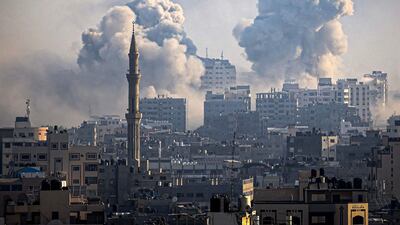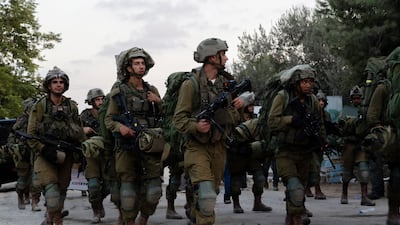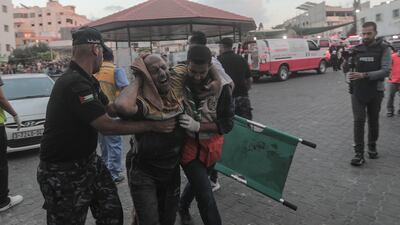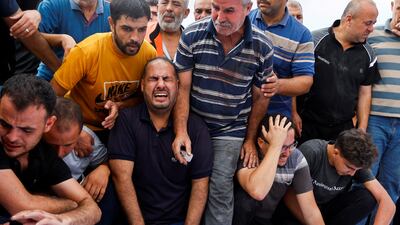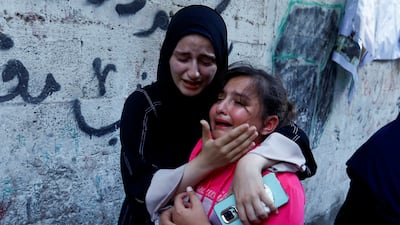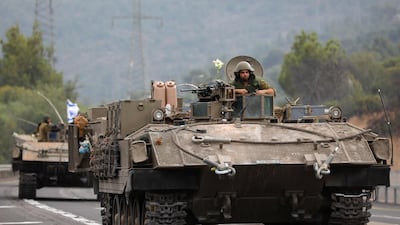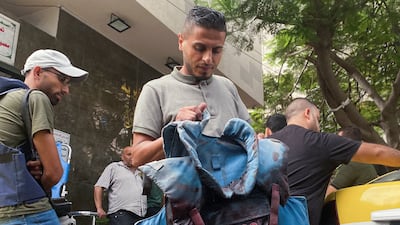Live updates: Follow the latest news on Israel-Gaza
Waving a Palestinian flag on British streets “may not be legitimate” if it is deemed to show support for acts of terrorism Home Secretary Suella Braverman has told police chiefs, sparking further warnings it could curtail freedom of expression.
Ms Braverman urged officers to use the “full force of the law” against support for Hamas or bids to intimidate the UK's Jewish community.
In a letter addressed to chief constables in England and Wales, Ms Braverman said: “Sadly, experience indicates that whenever Israel is attacked … racists seek to use legitimate Israeli defensive measures as a pretext to stir up hatred against British Jews and increase fear within the Jewish community.”
Chris Doyle, Director of the Council of Arab-British Understanding (Caabu), said: “It is ridiculous and deeply divisive to even suggest the banning of raising the Palestinian flag.
“Palestinians have a legitimate right as do those who support them to back their quest for freedom and self-determination.
“It is dangerous to conflate the atrocities committed by Hamas with legitimate Palestinian demands that are backed up by international law. It is highly irresponsible, risking stirring up community tensions all for political gain. There is absolutely nothing wrong with waving a Palestinian flag at all, and nobody should suggest that ever.”
The Palestine Solidarity Campaign was unable to comment on the suggested restrictions. The European Legal Support Centre, which advocates for the rights of Palestinians in Europe has also been contacted.
A pro-Palestinian march is planned through Bradford city centre in the north of England today, with people expected have been to bring flags and placards. Organiser Muktar Ali hopes the police will still allow the flags and let people march peacefully.
He told The National: “We are expecting around 150 people to attend. Our purpose is to oppose the war and for peace. We do not want innocent lives lost and lots of people killed and displaced. I don’t know if people will bring flags.
“The Home Secretary … is trying to put restrictions on what would normally be called freedom of speech and expression. Usually, governments do not take sides, and this is a government of a civilised country curtailing our freedom of expression. It will be up to the police to decide how they interpret what she has said.
“We are a fair-minded community of all faiths and we all understand this is one of the greatest injustices of our time and we need to be able to express how we feel about it. I hope other faith leaders will join us. If people believe in equality then they should stand up and show it. I feel it is very unfair what has happened, we are against any kind of killing. We are just expressing our opinion, we are not for war, we are opposing it.”
On Tuesday, Keir Starmer said waving a Palestinian flag on the streets could be an issue depending on the circumstances.
The Labour leader told LBC radio: “It’s very important that at times like this we don’t conflate peaceful discussion of Palestinian issues with Hamas.
“Now, the flags is a different situation. It really depends on the circumstances. If it’s provoking or encouraging attacks that might be one thing, there might be other situations.”
He added: “What we have seen is attacks on Jewish communities in north London and I know first-hand that’s having a huge impact on Jewish communities, and not for the first time.”
Ms Braverman set out examples of protesting that could amount to public order offences, including targeting Jewish neighbourhoods, waving pro-Palestinian or pro-Hamas symbols and chanting slogans that could be interpreted as anti-Israeli. “Behaviours that are legitimate in some circumstances, for example. the waving of a Palestinian flag, may not be legitimate such as when intended to glorify acts of terrorism,” the letter states.
“I encourage all chief officers to ensure that any protests which could exacerbate community tensions by way of offensive placards, chants, or behaviours that could be construed as incitement or harassment, have a strong police presence to ensure perpetrators are appropriately dealt with and that communities feel protected,” she added.
Prime Minister Rishi Sunak vowed to “hold people to account” if they are found to be supporting Hamas in Britain.
Ms Braverman, in her letter, said she recognised that decisions on arrests were “rightly an operational matter for police”, and urged forces to “use all available powers to prevent disorder and distress to our communities”.
“It is not just explicit pro-Hamas symbols and chants that are cause for concern,” she said.
“I would encourage police to consider whether chants such as 'From the river to the sea, Palestine will be free' should be understood as an expression of a violent desire to see Israel erased from the world, and whether its use in certain contexts may amount to a racially aggravated Section 5 public order offence.
“I would encourage police to give similar consideration to the presence of symbols such as swastikas at anti-Israel demonstrations. Context is crucial.
“Nor is it acceptable to drive through Jewish neighbourhoods, or single out Jewish members of the public, to aggressively chant or wave pro-Palestinian symbols at.
“Where harassment is identified, I would encourage the police to take swift and appropriate enforcement action.”
In London, the Metropolitan Police was forced to increase the presence of officers on the streets after days of protests led to several arrests. Some Jewish and Muslim institutions were targeted.


